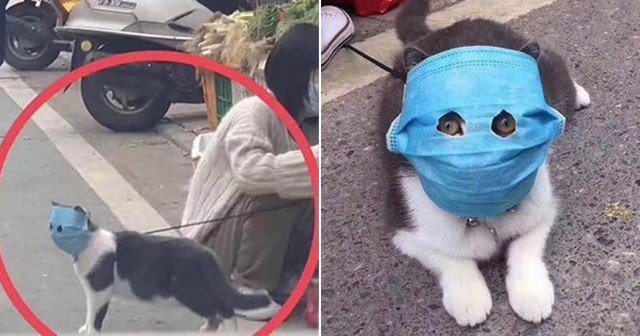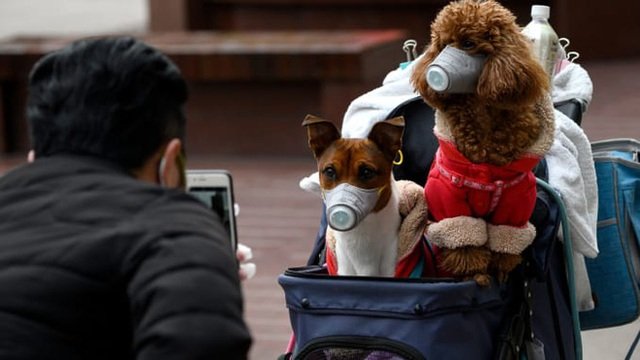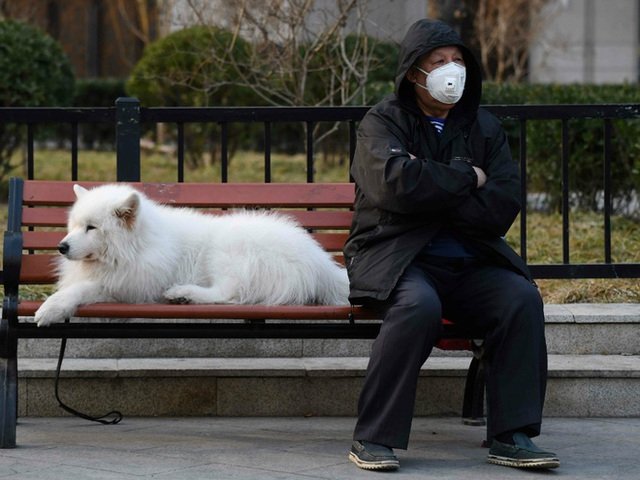Dogs and cats are good friends in our homes – but amid the Covid-19 epidemic, many people are concerned that they could accidentally become an intermediate host transmitting the virus to humans?
Medical experts around the world agree that the answer is almost certainly NO!
So why did a dog in Hong Kong last week test positive for the Covid-19 virus?
Last Friday, Hong Kong’s Department of Agriculture, Fisheries and Conservation (AFCD) said that fluid samples taken from the nasal and oral cavity of a dog, the pet of a Covid-19 patient, tested positive.
This is believed to be the first time in the world that a dog has tested positive for this virus.
It will be tested many times until the samples return negative results.
Despite this, both AFCD and the World Health Organization agree that there is no evidence that pets such as cats or dogs can be infected with the new coronavirus.
So why did a dog test positive for the virus?
We know that the new coronavirus can live on surfaces and objects, although researchers don’t know exactly how long the virus can survive on them.
This is a concern in mainland China, causing the country’s central bank to recall to disinfect and destroy potentially disease-carrying cash.
In the same way, the coronavirus can also attach to the surface of a dog or cat, even if they are not actually infected.
Sheila McClelland, founder of the Hong Kong-based charity Lifelong Animal Protection (LAP), wrote in a letter to the city’s authorities: `Current evidence shows that dogs
McClelland said there have been no confirmed cases of cats or dogs with Covid-19 anywhere in the world, and there are no published studies showing that coronavirus tests are accurate in dogs.
Can pets transmit coronavirus to you?
During the SARS epidemic in 2003, there were similar concerns that this strain of coronavirus could be transmitted to livestock.
Jane Gray, a veterinary surgeon with the SPCA in Hong Kong, said there are several strains of coronavirus that spread in dogs and cats – but not the new strain of corona that is causing Covid-19.
Back in 2003, scientists said the chances of catching SARS from domestic cats were extremely low.
According to the US Centers for Disease Control and Prevention, the main way Covid-19 currently spreads is still from person to person, when we come into close contact with a sick person or are accidentally infected with droplets.

So should pets be quarantined?
According to Gray, isolating livestock is still valuable from a scientific perspective, because it allows researchers to observe how an animal is related to a disease that is still unknown.
`While it may seem a little scary, this is purely a preventative measure. And it’s certainly nothing for general pet owners to be concerned about,` Gray said.
Some owners in China have bought and worn cute little face masks for their pets, but Gray said that doesn’t do them any good – in fact, it may make them sick.
One measure that pet owners can take during the Covid-19 epidemic is still good hygiene.
Both the WHO and Gray say pet owners should wash their hands with soap and water after touching their pets.

`I’m certainly not concerned about the risk from my dog or my cat, I’m more concerned about whether I get the virus from someone else who has the disease,` said Gray, who also has pets.
What is the bigger risk?
For veterinarians and animal rights experts, there is a bigger problem than the potential for coronavirus transmission from pets: the spread of fear.
Following an announcement claiming a dog in Hong Kong tested positive for the new coronavirus last week, the charity Lifetime Animal Protection (LAP) – a group that helps rehabilitate animals in Hong Kong –
McClelland, LAP’s founder, said she has been contacted by `countless people` who are worried about their pets.
`In a state of panic, people may abandon or kill their pets,` she said.
According to a report by New Scientist, during the SARS epidemic in 2003, some people stole their owners’ pets and killed them when they feared the animals were carrying the disease.

In Wuhan – the city that has been locked down and is the current epicenter of the Covid-19 epidemic in China – many pets have been locked up and left alone when their owners are stuck outside the city.
Furry Angels Haven, a group working to rescue homeless and abandoned pets in Wuhan, says there has `unquestionably` been an increase in the number of abandoned pets since the outbreak
So far, Gray and McClelland have not seen any signs of an increase in pet abuse or neglect in Hong Kong.
Why should pets be kept?
In contrast, with almost zero risk of disease transmission, Gray said pets can be especially helpful during stressful times of the epidemic, when many people are simply stuck at home.
Pets can be happy to spend extra time with their owners, and it can help them reduce stress and lower blood pressure, Gray says.
Marco Leung, a Hong Kong resident who has raised dogs for 7 years, said he is not worried about pets being infected with the coronavirus.

During the Covid-19 epidemic, Leung had to work from home, so he was in contact with his pets all day.
`Working from home is very, very boring, so we spend more time playing together,` Leung said.
Refer to CNN



